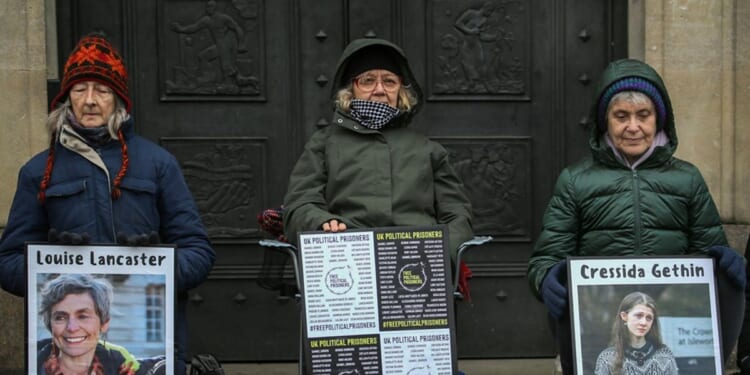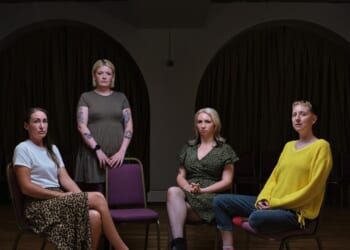THE death of Pope Francis triggered an avalanche of commemoration. What stood out was his commitment to serving the marginalised and, in particular, the incarcerated. As someone who has recently been released from prison, I agree with him that we have a lot of collective work to do around how we define justice, and how we respond to harm in the first place.
In July 2024, I was handed a four-year prison sentence for my involvement in a series of non-violent motorway blockades with the campaigning group Just Stop Oil. Until a couple of years ago, being sent to prison for non-violent climate activism was a rarity. But, since then, there has been a steady encroachment on civil liberties, to the point that multi-year prison sentences in these cases have been established by the higher courts as an acceptable penalty.
My sentence was altered on appeal, to 2.5 years. In total, I spent nine months inside, experiencing remand conditions, closed prison, and open prison. I am still serving my sentence “in the community”, which means that I am out of custody, but still under supervision and subject to licence conditions.
Serving time in prison made me realise that the crackdown on non-violent direct action, and the incredibly hefty sentences given to my co-defendants and me, is not some anomaly in an otherwise well-functioning justice system. After I had met so many people who had been neglected and scapegoated for their entire lives, it couldn’t have been clearer that I was one of the lucky ones.
Pope Francis understood and proclaimed openly that prisons were a large-scale scapegoating mechanism to avoid addressing deep-rooted social injustice. By putting the blame for a crime solely upon an individual, we remove the necessity to reflect upon our own culpability as a society. In his own words, “Denying the injustice present in society and creating these spaces to put offenders is easier than offering equal development opportunities to all citizens.”
Carceral logic is the belief that control and punishment enforces good behaviour. It is a deeply ingrained mindset, to the extent that the notion of “justice” has become synonymous with punishment. For justice to be served, someone has to be locked up.
IF YOU try to rationalise the carceral mindset, you come to the reasoning that punishing an individual makes them think twice before repeating their actions. This rationale has been disproven again and again — in fact, it has been shown that prison often increases rates of reoffending.
Yet the carceral mindset remains, because it’s not a mindset based on truth, but on dogma. A dogma that does not reduce harm, but, instead, scapegoats certain people to entrench inequality and concentrate power at the top of the social hierarchy. It is backed up by the culturally inherited and often racist belief that some humans are by nature selfish, lazy, and violent.
“Whatever a detainee may have done, he remains always beloved by God,” is also a quotation from Pope Francis, and speaks to a very different view of human nature. He clearly believed that no one is inherently bad. If someone commits a crime, there is always a reason. Acknowledging the reason is not the same as saying that the crime is OK.
But it allows us to get to the root of what needs to be tackled. And, in my experience of talking to other prisoners, the root was often entrenched social injustice. I met huge numbers of women who entrusted me with their jaw-dropping stories, and the following gives just a snapshot of the circumstances that can lead some to be locked up.
Imagine yourself as a young adult, still in your teens, or just into your early twenties. After catching a lift with your friend, it turns out that they had a weapon stored in the boot of their car. You are arrested, remanded, convicted of a firearms offence, and sentenced to five years’ imprisonment. You didn’t know about the weapon? Tough luck: ignorance is no defence in firearms law.
Or imagine standing behind a glass screen in an airless courtroom, and being handed a ten-year prison sentence for conspiracy to supply Class A drugs. Ten years. The operation was actually being run by your ex-partner, who coerced you into picking up and dropping off suitcases without knowing what their contents were. After years of enduring their physical abuse, you were terrified that if you didn’t follow orders, they would force their way back into your life and start assaulting you again.
Or what if your earliest memory was being beaten by your stepfather? Imagine growing up with violence and neglect hampering your development at every turn. Imagine growing into a young adult who consistently deals with severe depression, post-traumatic stress, and psychotic episodes. You have been in contact with social services for years, but they have not given you any meaningful help. Imagine being violated and neglected for so long that you reach a point at which you cannot cope for one minute longer — you leave your home, and, in a state of trauma and despair, you set fire to a series of public bins. You are arrested, later convicted of reckless arson, and sent to prison. Apparently, you are the problem.
But, of course, you are not the problem. In a healthy society in which we looked after one another, and community was strong, no one would feel that carrying a gun was the only way in which they could ensure their own safety. In a healthy society, people would not be abused behind closed doors. We would not be dependent on a squeezed social-welfare service whose dehumanising, bureaucratic structures prevent its offering people meaningful care and support.
PUTTING someone in prison as a punishment does nothing to address the root problems and, therefore, does nothing to reduce harm. The definition of the word “criminal” is simply “someone who has committed a crime”, but, when you search for the word in a thesaurus, it is clear how deeply moralised the word is in our collective psyche. Synonyms include “villain, crook, evildoer, sinner, transgressor, delinquent”.
The religious connotations behind these loaded words affords them cultural power. And yet there is a great deal of compassionate work done in and around prisons by faith-based organisations. At Christmas, in the prison where I was held, a charity, the Nazareth Way, worked with the prison chapel to provide stocking gift-bags and a small amount of free phone credit to every prisoner. In an environment of such scarcity and dehumanisation, such a gift can mean the world, both in an emotional, but also in a practical, sense.
For those prisoners who have no outside financial support, phone credit — the ability to talk to your loved ones — can be literally unaffordable, owing to the pittance earned from prison work, which is mandatory for sentenced prisoners. Wages differ between establishments, but my experience of earning £1.43 for each two- to three-hour work session was pretty standard.
It was through the prison chapel that I met Tanni (whose name has been changed), a fellow prisoner, who taught me a great deal about the relevance of Christianity to the circumstances we had been put in. Tanni was raised in the Pentecostal Church, and knew the Bible back to front, reading and meditating on it daily. We connected over music I play the piano, and she is a great singer; so, together, we worked with the chapel to provide live accompaniment for the hymn-singing at the Christian Sunday service.
One day, while out in the yard for our daily allowance of fresh air, Tanni mentioned the story in St John’s Gospel of the woman accused of adultery, which firmly demonstrates Jesus’s stance on punishment as a response to suspected wrongdoing.
We all know the story: the woman faces being stoned to death for her crime, as was perfectly socially acceptable at the time. But Jesus says to the crowd, “Whichever one of you has committed no sin may throw the stone at her,” challenging them to look into their own hearts before judging somebody else. He is not morally ambiguous about adultery, counselling the woman not to repeat her actions. But he saves her life and touches her heart, giving her the opportunity and humanity that she deserves.
Just as we now grimace at the idea of people being stoned to death, could it be that future generations will look back on this period of history and marvel at the inhumanity of our criminal-justice system? They may well be incredulous and ashamed to know that we used to keep fellow human beings in locked cells behind razor-wire fences.
In the UK today, it is the law of the land to lock people away for years, and even decades, for crimes that they either did not commit (in joint-enterprise convictions) or crimes committed under the most horrendous circumstances. In light of the women I met, and the stories that I heard, I would suggest that, for the majority of people, me included, we cannot be sure that, if we were put in the same terrible circumstances, we would have acted any differently.
Our justice system is more like a vengeance system. It does much more harm than good, breaking up families and deepening existing trauma. I wonder what Jesus would have said about that, and what he would have done to intervene? Perhaps he would be storming the Ministry of Justice, just as he stormed the temple where corrupt traders did business. He would certainly be telling the truth, as Pope Francis did: that prisons do not make society safer, and that we need to rethink radically our approach to harm and conflict.
And for Christians and ascribers to Christian values, it is for us to turn the spotlight inwards, reflect on what assumptions we hold about prisoners and the criminal-justice system, and ask how we can be part of dismantling carceral logic in ourselves, in our communities, and in the wider world.

















